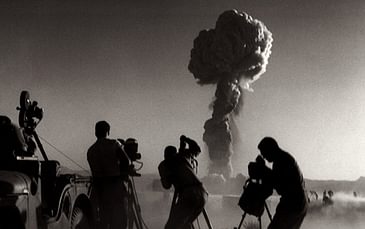Nathan and Lee from the UnCover Up podcast join today’s conversation in discussing their favorite nuclear movies spanning over the decades, involving wars, nuclear disasters, and so much more! Amongst the 100’s of movies, they’ll be touching on just a sampling—this is a conversation you won’t want to miss!
Nathan kicks off this movie marathon conversation chatting about the Missile Command game, and the science fiction novel Colossus. They discuss the details of both nuclear war and nuclear testing movies. Does nuclear testing really cause things to become giant? Learn about films like “Them!”(1954), “Gojia” (1954), “The Day the Earth Caught Fire”(1961), “Atomic Cafe” (1982), and others. But, movies touching on issues of global warming, nuclear technology, and the like are not void of comedic relief. Listen to the contrast of shots showing explosions, to shots of meager civil defense attempts that governments direct for their citizens. Nathan and Lee touch on the sub-genre of nuclear energy movies that capture those such as “China Syndrome and “Chernobyl”.
Backing-up for a moment, these three shift the conversation towards another sub-category—nuclear war horror. “Panic in Year Zero”, “Threads”, “The Day After”, and the Russian film “Dead Man’s Letters”, are all examples of horror movies. Learn about the depression scale these movies fall under and the further bizarre films created for after war, the post-war dystopia genre. Shelly asks about the thoughts, emotions, and connections that these films provoke in their watchers. While there can be times of realizations of absurdity, they recall how they felt throughout these various films as audience members. There is a unique intelligence assumed within these genres that allow for scenes that are shown, but left unexplained.
Moving to discuss movies after the bombings in Hiroshima and Nagasaki, Shelly draws attention to “Barefoot Gen”. Viewers realize that even in a world devastated by nuclear annihilation, the issue of racism still exists, even internal racism. Shifting to happier nuclear war films, they do find a category for war and nuclear apocalypse comedies. “Dr. Strangelove” and the Canadian animated short, “The Big Snit”, are two they delve into.
As the episode draws to a close, Shelly, Nathan, and Lee all select one film to watch in a movie marathon for deeper discussion on a future episode. Join the team as they watch “Dr. Strangelove”, “The Day After”, and Fail Safe”. Watch “Fail Safe” (1964) so you do not miss what they consider to be one of the very finest endings. Shelly gives a shout-out to the Super Critical Podcast who looks into nuclear movies one by one. Gather your family and friends for a nuclear movie marathon!
Links:
My Nuclear Life now has a Patreon page, where you can subscribe for bonus content!
Production costs for this episode were provided through National Science Foundation Grant PHY-2011267.
All Movies Discussed (by release date):
Gojia (1954)
Them! (1954)
Beginning of the end (1957, Mystery Science Theatre)
I Live in Fear / Record of a Living Being (1955)
The World, the Flesh & the Devil (1959)
The Day the World Caught Fire (1961)
Panic in the Year Zero (1962)
Fail Safe (1964)
Dr. Strangelove or: How I Learned to Stop Worrying and Love the Bomb (1964)
Crack in the world (1965)
Giant Spider Invasion (1975)
The China Syndrome (1979)
Atomic Cafe (1982)
The Day After (1983)
Barefoot Gen (1983)
War Games (1983)
Threads (1984)
The Big Snit (1985)
Dead Man’s Letters / Pisma myortvogo cheloveka (1986)
Black Rain / Kuroi ame(1989)
Last Night (1998)
White Light / Black Rain: The Destruction of Hiroshima and Nagasaki (2007)
Chernobyl (2019)






